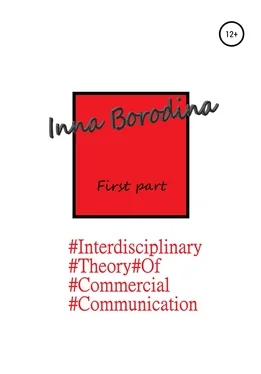Inna Borodina
Interdisciplinary theory of commercial communication. First part
The book presents an interdisciplinary theory of communications, which is the development of the scientific approaches set forth earlier in the monograph "Systems of management of advertising communications of the company" and is its continuation. The basic principles of organizing developing socio-economic systems are described, taking into account various fields of scientific knowledge, including philosophy, neurobiology, cybernetics, sociology, economics, econophysics, systems theory, information theory, mathematical modeling theory, entropy theory, synergetic information theory, mathematical logic and logic predicates, semantics and many other scientific developments from border areas of knowledge. The basic principles of organizing a thesaurus in cybernetic systems and possible effects of information influence on a person are described.The author has developed and described a new high-level programming metalanguage Noice. Borodina Inna, 2020.
The research was carried out at the expense of the author.
Author's edition. Errors and comments send email, contacts for communication with the author: borodina.innversiy@gmail.com
Reviewers: Highest academic degree: doctorate in economics, prof. Arzhenovskiy S.V.; Highest academic degree: doctorate in philosophy, assoc.prof. A.V. Shcherbina; P.h.D.: doctorate in biology: Scherbina D.N.
The book presents an interdisciplinary theory of communications, which is the development of the scientific approaches set forth earlier in the monograph "Systems of management of advertising communications of the company" and is its continuation. The basic principles of organizing developing socio-economic systems are described, taking into account various fields of scientific knowledge, including philosophy, neurobiology, cybernetics, sociology, economics, econophysics, systems theory, information theory, mathematical modeling theory, entropy theory, synergetic information theory, mathematical logic and logic predicates, semantics and many other scientific developments from border areas of knowledge. The basic principles of organizing a thesaurus in cybernetic systems and possible effects of information influence on a person are described. Borodina Inna, 2020.
This research paper is fundamental and describes the study of the impact of commercial communications on consumer demand. If there is an experimental research base (a company that carries out commercial communications in the consumer market), all theoretical developments can be implemented as applied ones.
Modern socio-economic concepts are characterized by the interpenetration of border areas of knowledge in the formation of new approaches to the study of market reality. To a large extent, this also applies to studies of consumer behavior in the consumer market. The increasing interest of researchers is attracted by the problem of bounded rationality and the mechanisms of its occurrence. The influence of marketing communications on the consumer seems to be proven. Achievements in this area are widely known, represented by the works of J. Stigler in the "Economic Theory of Information"1, W. Becker2, however, the mechanism of the influence of advertising information on the buyer, localized to the level of consciousness, is still terra incognita. As G. Simon notes in his work "Rationality as a process and a product of thinking": "… economic theory was mainly concerned with the results of rational choice, and not the process of choice …"3.
The epistemology of such a phenomenon as “consumer behavior” in the context of informing a potential consumer requires an appeal to the philosophy of postmodernism, which does not allow legitimation when describing cognizable phenomena. The most common approach that describes not so much buying behavior as its external manifestations in the form of demand. The consumer himself and his internal motives are modeled as a “black box”, when only input and output signals (price offer and price offer) remain registered events. A more subtle and detailed study of consumer behavior is required, it has been successfully implemented both in micro- and macroeconomics, modern social trends and the preconditions of an institutional economy focused on the growth of the role of informatization in general.
Rapidly developing, the relatively new field of research – behavioral economics, which allows to study the reasons and motives of human decisions in a variety of socio-economic conditions, can serve as a starting point is the investigation of the reader.
The problem of making a decision in favor of buying a product based on this or other information can be considered in the context of a speculative concept. It is not speculation in the price of a commodity that is considered here, but information speculation by the usefulness of the act of purchase, speculation with the choice “to buy or not to buy a commodity”. Informing a potential buyer about a product – creates a psychological pattern, an individual mental model of interaction at the moment of a collision of a buyer with a product.
The sphere of commercial activity of sellers is aimed at mutually beneficial exchange of utility between sellers and buyers. The purpose of the functioning of the consumer goods market is to form a set of requests for goods and prices.
Behavioral reactions in the chain of communication events change under the influence of advertising information. Market relations are defined as economic and social models of behavior of participants in the process.
Through mass communication, information about the product is transmitted from the seller to potential buyers.
This interpretation of market processes makes it possible to talk about the following: the analyzed phenomenon is a retailer's communication system; interaction of system elements is the exchange of utility and information between the seller and the buyers. The demand for goods and prices is the result of the firm's communications management.
Commercial relations is defined as a socio-economic category that characterizes the degree of non-randomness of information and a set of potential transactions.A change in all states of a mass communications management system is interpreted as a change in time. The number of moments of the system's own time corresponds to the number of all its events.
The recipient of information is a hypothetical “generalized person” with quasi-needs4. "Information" includes: any commercial information, including marketing information, published by the seller through the media and places where the goods are offered on the market. "Mass communication" is defined here as a kind of social communication. The outcome of communication management is effective if the behavior of buyers is fair in relationship, to the purchase of the product.
The value of the study of system-oriented management of mass communications lies in the potential for predicting the beginning inconsistency in the structure of the system under consideration. The study of market interaction, which is relevant in modern conditions, makes it possible to determine the moment when the elements of the system enter the area of structural stress. This serves as a pretext for the development and implementation of new social technologies allowing to influence demand, preventing a decrease in its growth rate. The developed approach is available for practical application in the work of analytical departments of firms engaged in research in the field of advertising and commercial communications. In the study of the problem, the works of many domestic and foreign researchers should be noted. The formulation and solution of target problems belongs to such well-known authors as J. Stigler1, J.-J. Lamben5, M. Stiegemann6, M. Roberts7, K. Bagwell8 and many others. The most popular approach to solving problems describing advertising communications management systems is the use of game theory, among them such famous scientists as S. Markowitz and W. Dorazelski9, J. Becker and K. Mapfi10, Arrow K.11.
Читать дальше












